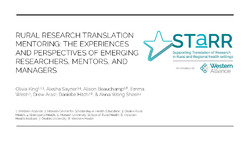Please use this identifier to cite or link to this item:
http://hdl.handle.net/11054/2321| Title: | Rural research translation mentoring: the experiences and perspectives of emerging researchers, mentors, and managers. |
| Author: | King, O. Sayner, Alesha Beauchamp, A. West, E. Aras, D. Hitch, D. Wong Shee, Anna |
| Issue Date: | 2023 |
| Conference Name: | Western Alliance 2023 Symposium. |
| Conference Date: | November 21-22 |
| Conference Place: | Warrnambool, Victoria |
| Abstract: | Background/aim: Research translation capacity and capability building is crucial for increasing the implementation of research into health practice and improving health outcomes. Translating evidence into practice is particularly important in rural and regional settings to address the complex problems impacting these communities. Research capacity building programs typically involve training and mentoring; however, little is known about the characteristics and influence of mentorships on emerging researchers working in rural and regional healthcare settings. Research translation mentorships are an integral part of the Supporting Translation Research in Rural and Regional settings (STaRR) program that was developed and delivered in Western Victoria from 2020 - 2021. Our qualitative study explored how mentorships for rural and regional emerging researchers functioned, developed, and contributed to research translation capacity and capability building. Population/setting: Participants included emerging researchers (n=9), mentors (n=5), and managers (n=4), from five health services and two universities. Methods: Interviews were conducted approximately 12 months after the inaugural program and explored participants’ experiences of the mentored training. Telephone interviews were audio-recorded, and transcribed. Data were analysed using a five-stage framework approach, drawing on the four research translation domains of the Translating Allied Health Knowledge (TAHK) framework. Results/findings: We identified four themes: (1) Mentors play an educative role; (2) Mentoring is enhanced by a collaborative environment; (3) Organisational challenges can influence mentorships, and (4) Mentorships help develop research networks and collective research and translation capacity. These themes aligned with one or more of the TAHK domains: doing research translation, social capital for research translation, inclusive, and sustaining research translation. Conclusion: Mentorships contributed to research translation capability development. The building of research translation knowledge and skills and the expansion and strengthening of research networks were central to capability development across all three participant groups. The alignment of these capabilities with the TAHK framework suggests the mentoring element of the STaRR program is helping address the elements of research translation in a complex and comprehensive way. Translational impact/implications for future practice: These findings have informed the development of resources to support mentors and emerging researchers as they engage and participate in the STaRR program. |
| URI: | http://hdl.handle.net/11054/2321 |
| Internal ID Number: | 02353 |
| Health Subject: | RESEARCH TRANSLATION CAPACITY BUILDING RESEARCH EDUCATION REGIONAL HEALTHCARE RURAL HEALTHCARE |
| Type: | Conference Presentation |
| Appears in Collections: | Research Output |
Files in This Item:
| File | Description | Size | Format | |
|---|---|---|---|---|
| Western Alliance Symposium_STaRR mentoring_2023_Nov_Olivia King (002).pdf | 1.28 MB | Adobe PDF |  View/Open |
Items in DSpace are protected by copyright, with all rights reserved, unless otherwise indicated.
